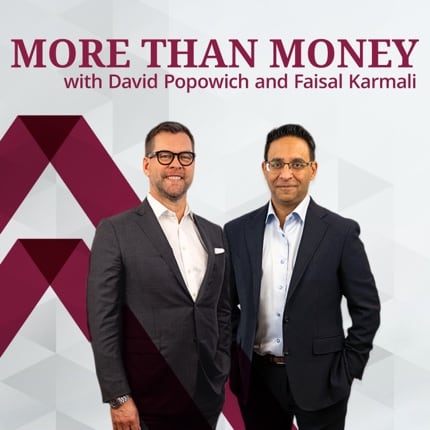What comes to mind when you hear the word ‘insurance’?
That car accident you got into when you were a teenager?
Fighting with the insurance company over a claim for damage to your home?
The medical hoops you jumped through to get life insurance?
When you are younger, insurance represents protection at best. If you pass away, it ensures your mortgage is covered and your family is taken care of. If you have an accident, it provides the money you need to fix your car. At worst, it is merely a drain on your savings.
That perspective shifts when you are transitioning to or living in retirement.
More Than Money Radio recently had Julia Garner, Estate Planning Specialist, CIBC Wood Gundy, on the show to bust some common misconceptions about insurance and to explain how it is so much more than just an expense; it is an investment.
Garner explains that it is natural for people to consider insurance a cost. You may have paid into policies for much of your adult life without getting anything in return. You may view it as the cost of driving a vehicle or of owning a home. When it comes to life insurance, you pay money out and hope that you live a long, healthy life and ultimately get nothing in return. However, when it functions as an investment, insurance can actually be a powerful tool for wealth planning.
So how can insurance be used as an investment?
You do not view contributing to your investment account a cost; it is an investment. You put money in with the expectation that you will get a return. You can do the same thing with insurance.
When you invest in insurance, you are participating in the success of an insurance company. That means you can earn income, including dividends, from that investment.
The number one question Garner gets from clients is ‘How do I pay less tax?’ Life insurance is one option to make your wealth more tax-efficient.
With permanent life insurance, the cash within the policy can grow tax-exempt and can be invested in a variety of investment funds. And, when you pass away, your beneficiary can receive your death benefit tax-free.
Think of it this way. Tax Free Savings Accounts (TFSAs) allow you to set money aside tax-free throughout your lifetime. But here is the catch: your TFSA has an annual contribution limit. Investing in life insurance is analogous to opening a TFSA with no limit as to how much you can contribute. However, this supersized TFSA is not for you; it is for your beneficiaries to receive after you are gone. The added benefit is that it can save you tax during your lifetime.
Insurance can also help you keep the assets that matter to you in the family. Take your family cottage as an example. It is not just an asset; it is a home full of memories. The problem is that while principal residences are not subject to capital gains tax, secondary properties are. This means that your children may have to sell the cottage after you pass in order to pay the tax. If you have a life insurance policy, it could help solve this problem by providing the cash your family needs for the tax bill.
When is it the right time to start viewing life insurance as an investment?
Garner says when you realize you have surplus capital. This often happens when you go through the financial planning process. Your advisor looks at the ‘big picture’ of your finances and tells you that you have more assets that you will need in your lifetime. The question then becomes ‘how do you create efficiency around that reality?’
Want to learn more about how life insurance could fit into your overall wealth strategy? Let’s talk! We can help you find the solution that is right for you.
“CIBC Private Wealth” consists of services provided by CIBC and certain of its subsidiaries through CIBC Private Banking; CIBC Private Investment Counsel, a division of CIBC Asset Management Inc. (“CAM”); CIBC Trust Corporation; and CIBC Wood Gundy, a division of CIBC World Markets Inc. (“WMI”). CIBC Private Banking provides solutions from CIBC Investor Services Inc. (“ISI”), CAM and credit products. CIBC Private Wealth services are available to qualified individuals. Insurance services are only available through CIBC Wood Gundy Financial Services Inc. In Quebec, insurance services are only available through CIBC Wood Gundy Financial Services (Quebec) Inc. The CIBC logo and “CIBC Private Wealth” are trademarks of CIBC, used under license. “Wood Gundy” is a registered trademark of CIBC World Markets Inc.
This information, including any opinion, is based on various sources believed to be reliable, but its accuracy cannot be guaranteed and is subject to change. CIBC and CIBC World Markets Inc., their affiliates, directors, officers and employees may buy, sell, or hold a position in securities of a company mentioned herein, its affiliates or subsidiaries, and may also perform financial advisory services, investment banking or other services for, or have lending or other credit relationships with the same. CIBC World Markets Inc. and its representatives will receive sales commissions and/or a spread between bid and ask prices if you purchase, sell or hold the securities referred to above. © CIBC World Markets Inc. 2024.
Clients are advised to seek advice regarding their particular circumstances from their personal tax and legal advisors.
David Popowich and Faisal Karmali are Investment Advisors with CIBC Wood Gundy in Calgary. The views of David Popowich and Faisal Karmali do not necessarily reflect those of CIBC World Markets Inc..
If you are currently a CIBC Wood Gundy client, please contact your Investment Advisor.











